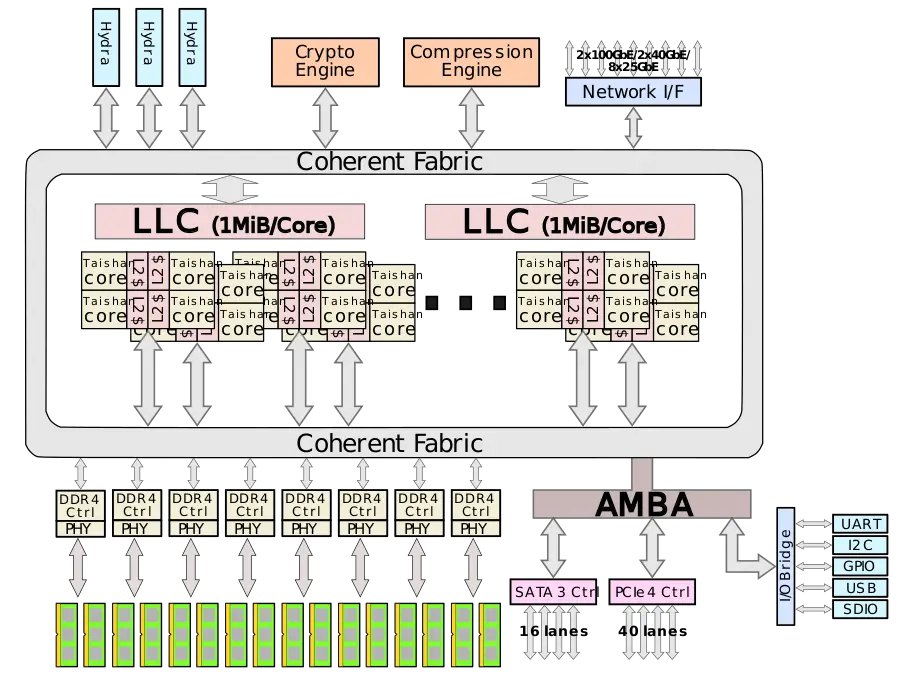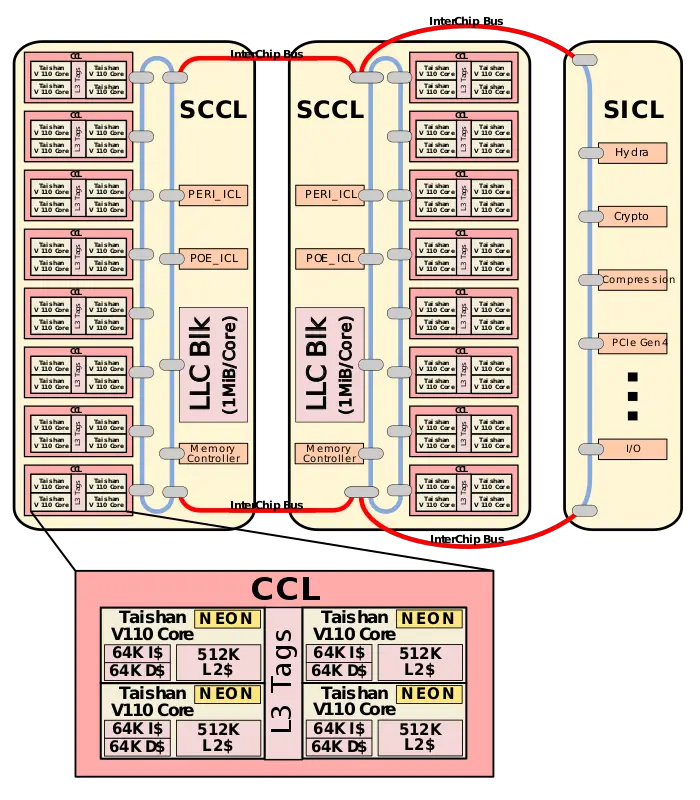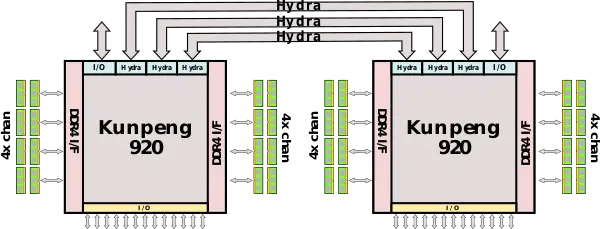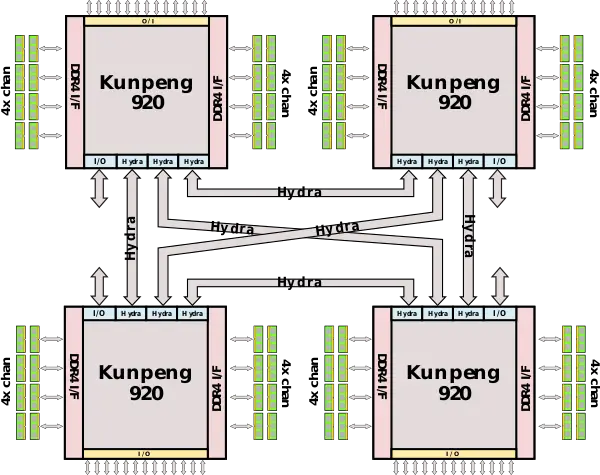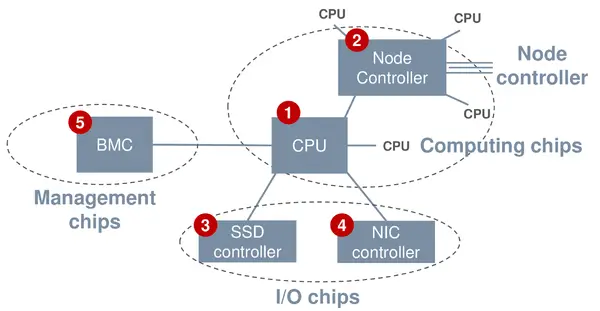[转帖]TaiShan v110 - Microarchitectures - HiSilicon
https://en.wikichip.org/wiki/hisilicon/microarchitectures/taishan_v110
| Edit Values | |
| TaiShan v110 µarch | |
| General Info | |
| Arch Type | CPU |
| Designer | HiSilicon |
| Manufacturer | TSMC |
| Introduction | 2019 |
| Process | 7 nm |
| Core Configs | 32, 48, 64 |
| Pipeline | |
| Type | Superscalar, Superpipeline |
| OoOE | Yes |
| Speculative | Yes |
| Reg Renaming | Yes |
| Decode | 4-way |
| Instructions | |
| ISA | ARMv8.2-A |
| Extensions | NEON |
| Cache | |
| L1I Cache | 64 KiB/core |
| L1D Cache | 64 KiB/core |
| L2 Cache | 512 KiB/core |
| L3 Cache | 1 MiB/core |
| Succession | |
|
|
|
TaiShan v110 is the successor to the TaiShan v100, a high-performance ARM server microarchitecture designed by HiSilicon for Huawei's own TaiShan servers.
contents
[hide]
Brands[edit]
TaiShan-based CPUs are branded as the Kunpeng 920 series.
Release Dates[edit]
Kunpeng 920 CPUs were officially launched in early 2019.
Architecture[edit]
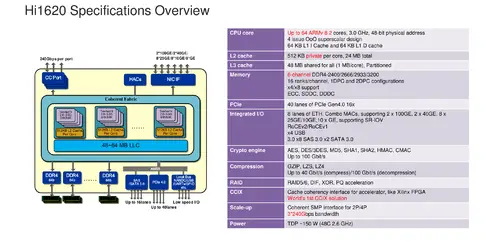
Overview
Key changes from TaiShan v100[edit]
- TSMC 7 nm HPC process (from 16 nm)
- 2x core count (64, up from 32)
- Custom cores (from Cortex-A72)
- ASIMD
- double SP Vector throughput (2 inst/cycle, up from 1)
- ASIMD
- Custom cores (from Cortex-A72)
- Memory
- 2x memory channels (8, up from 4)
- I/O
- PCIe Gen 4 (from Gen 3)
This list is incomplete; you can help by expanding it.
Block Diagram[edit]
Entire Chip[edit]
Memory Hierarchy[edit]
- Cache
- L1I Cache
- 64 KiB/core, private
- 64-byte cache lines
- L1D Cache
- 64 KiB/core, private
- 64-byte cache lines
- L2 Cache
- 512 KiB/core, private
- L3 Cache
- 1 MiB/core
- Shared by all cores
- System DRAM
- 1 TiB Max Memory / socket
- 8 Channels
- DDR4, up to 2933 MT/s
- 1 DPC and 2 DPC support
- 8 B/cycle/channel (@ memory clock)
- ECC, SDDC, DDDC
- L1I Cache
Overview[edit]
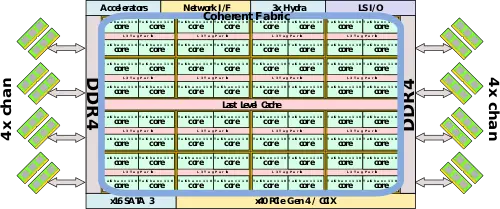
Overview
Though HiSilicon has a history of designing Arm processors. The TaiShan v110 core is HiSilicons' first custom homegrown high-performance ARM core and SoC design. The chip, which incorporates multiple compute dies and an I/O is a multi-chip package, is fabricated on TSMC's 7-nanometers HPC process and integrates up to 64 cores and up to 64 MiB of last level cache.
The SoC also incorporates a number of hardware accelerators. There is a crypto engine that supports AES, DES/3DES, MD5, SHA1, SHA2, HMAC, CMAC with throughputs of up to 100 Gbit/s. Additionally, there is also a compression engine supporting GZIP, LZS, LZ4 with compression throughputs of up to 40 Gbit/s and decompression of up to 100 Gbit/s.
Marketed as the Kunpeng 920, this SoC supports up to 4-way multiprocessing support through HiSilicon's Hydra interface. In order to keep the cores fed, eight DDR4 memory channels are incorporated per socket. Additionally, designed to facilitate an easy accelerator platform, there are 40 PCIe Gen 4 lanes provided per socket with CCIX support, enabling cache coherency.
Core[edit]
Each core is a 4-way out-of-order superscalar that implements the ARMv8.2-A ISA. Huawei stated that the core supports almost all the ARMv8.4 features with a few exceptions, including dot product and the FP16 FML extension. It features private 64 KiB L1 instruction and data caches as well as 512 KiB of private L2. Though light on details, Huawei says that compared to Arm's Cortex cores, their core features an improved memory subsystem, a larger number of execution units, and a better branch predictor.
ASIMD[edit]
Each core features a single 128-bit NEON unit. It is capable of executing single double-precision FMA vector instruction per cycle or two single-precision vector instructions per cycle. Operating at 2 GHz, a 64-core chip will have a peak compute of 512 GigaFLOPS of double-precision floating point. It's worth noting that compared to the TaiShan v100, the throughput for single-precision vector has been doubled from 1 to 2 instructions per cycle.
MCP physical design[edit]
The SoC itself comprises 3 dies - two Super CPU Cluster (SCCL) compute dies and a Super IO Cluster (SICL). The SCCL compute dies contains 8 CPU Clusters (CCLs), memory controllers, and the L3 cache block. There are eight CCLs on each of the SICL dies for a total of 64 cores. The CCLs are TaiShan V110 quadplex along with the L3 cache tags partition. The Super IO Clusters include the various I/O peripherals including PCIe Gen 4, SAS, the network interface controllers, and the Hydra links.
Scalability[edit]
- See also: Hydra Interface
Each chip incorporates three Hydra interface ports. The Hydra interface facilitates the cache coherency between the dies on the chip. Every link supports 240 Gb/s (30 GB/s) of peak bandwidth for a total aggregated bandwidth of 720 Gb/s (90 GB/s) in a 2-way symmetric multiprocessing configuration.
With all three links, there is also support for 4-way SMP. In this configuration, one link from each socket is connected to another socket for an all-for-all connection.
Chipset[edit]
Along with the Hi1620 SoC, HiSilicon developed a number of integrated circuits as part of the chipset platform.
| Chip | Description |
|---|---|
| Hi1620 | CPU, Kunpeng 920 series Chip |
| Hi1503 | CPU interconnect chip, supports scaling-up to 32 sockets |
| Hi1812 | SSD storage controller, for read/write I/O acceleration |
| Hi1822 | Network controller chip, DC high-speed flexible interconnect |
| Hi1710 | BMC management chip + enhanced RAS features chip |
Die[edit]
- TSMC 7 nm HPC
- 20,000,000,000 transistors
- 3-4 dies
All TaiShan v110 Chips[edit]
Bibliography[edit]
- Huawei. Personal Communication. 2019
- Huawei Connect 2018. October 2018
- HiSilicon Event. January 7, 2019
- Huawei, Supercomputing 2018
| codename | TaiShan v110 + |
| core count | 32 +, 48 + and 64 + |
| designer | HiSilicon + |
| first launched | 2019 + |
| full page name | hisilicon/microarchitectures/taishan v110 + |
| instance of | microarchitecture + |
| instruction set architecture | ARMv8.2-A + |
| manufacturer | TSMC + |
| microarchitecture type | CPU + |
| name | TaiShan v110 + |
| process | 7 nm (0.007 μm, 7.0e-6 mm) + |
[转帖]TaiShan v110 - Microarchitectures - HiSilicon的更多相关文章
- 华为TaiShan 2280 ARM 服务器
华为TaiShan 2280 ARM 服务器 华为TaiShan 2280 ARM 服务器 https://e.huawei.com/cn/products/cloud-computing-dc/s ...
- nginx负载均衡基于ip_hash的session粘帖
nginx负载均衡基于ip_hash的session粘帖 nginx可以根据客户端IP进行负载均衡,在upstream里设置ip_hash,就可以针对同一个C类地址段中的客户端选择同一个后端服务器,除 ...
- [转帖]网络协议封封封之Panabit配置文档
原帖地址:http://myhat.blog.51cto.com/391263/322378
- [转帖]零投入用panabit享受万元流控设备——搭建篇
原帖地址:http://net.it168.com/a2009/0505/274/000000274918.shtml 你想合理高效的管理内网流量吗?你想针对各个非法网络应用与服务进行合理限制吗?你是 ...
- 3d数学总结帖
3d数学总结帖,以下是对3d学习过程中数学知识的简单总结 角度值和弧度制的互转 Deg2Rad 角度A1转弧度A2 => A2=A1*PI/180 Rad2Deg 弧度A2转换角度A1 => ...
- [转帖]The Lambda Calculus for Absolute Dummies (like myself)
Monday, May 7, 2012 The Lambda Calculus for Absolute Dummies (like myself) If there is one highly ...
- [转帖]FPGA开发工具汇总
原帖:http://blog.chinaaet.com/yocan/p/5100017074 ----------------------------------------------------- ...
- [Android分享] 【转帖】Android ListView的A-Z字母排序和过滤搜索功能
感谢eoe社区的分享 最近看关于Android实现ListView的功能问题,一直都是小伙伴们关心探讨的Android开发问题之一,今天看到有关ListView实现A-Z字母排序和过滤搜索功能 ...
- AxureRP7.0各类交互效果汇总帖(转)
了便于大家参考,我把这段时间发布分享的所有关于AxureRP7.0的原型做了整理. 以下资源均有对应的RP源文件可以下载. 当然 ,其中有部分是需要通过完成解密游戏[攻略]才能得到下载地址或者下载密码 ...
- 未能加载文件或程序集“Newtonsoft.Json, Version=4.0.0.0, Culture=neutral, PublicKeyToken=30a [问题点数:40分,结帖人u010259408]
未能加载文件或程序集“Newtonsoft.Json, Version=4.0.0.0, Culture=neutral, PublicKeyToken=30a [问题点数:40分,结帖人u01025 ...
随机推荐
- Llama2-Chinese项目:2.2-大语言模型词表扩充
因为原生LLaMA对中文的支持很弱,一个中文汉子往往被切分成多个token,因此需要对其进行中文词表扩展.思路通常是在中文语料库上训练一个中文tokenizer模型,然后将中文tokenizer与 ...
- EDS从小白到专家丨生态产业链高效协同的一计良策
本文分享自华为云社区<[EDS从小白到专家]第3期:生态产业链高效协同的一计良策>,作者:开天aPaaS小助手 . 号外! 华为将于2023年9月20-22日,在上海世博展览馆和上海世博中 ...
- 聆听无声的话语:手把手教你用ModelArts实现手语识别
摘要:ModelArts,化作我们与听力障碍之间的一座沟通桥梁. 据统计,我国有超过2000万人有听力语言障碍,每年有约3万名婴儿生来就失去了聆听的机会.或许是因为缺少与没有听力障碍的人交流的途径,环 ...
- 新一代构建工具(1):对比rollup/parcel/esbuild—esbuild脱颖而出
文章内容来源: 字节前端是如何基于 ESBuild 的做现代化打包设计? https://mp.weixin.qq.com/s/bS_qwiOIMqFN1sfuPKTUbA 新世代建置工具解析(esb ...
- 总结vue3 的一些知识点:MySQL 排序
MySQL 排序 我们知道从 MySQL 表中使用 SQL SELECT 语句来读取数据. 如果我们需要对读取的数据进行排序,我们就可以使用 MySQL 的 ORDER BY 子句来设定你想按哪个字段 ...
- 信创就用国产的生态,Solon v2.6.4 发布
Solon 是什么框架? Java 新的"生态级"应用开发框架.从零开始构建,有自己的标准规范与开放生态(历时六年,具备全球第二级别的生态规模). 相对于 Spring,有什么特点 ...
- linux 只查看 java 进程
top $(ps -e | grep java | awk '{print $1}' | sed 's/^/-p/')
- ElasticSearch 精确查询统计
ElasticSearch 精确查询统计 match_phrase:短语匹配,不分词 GET logback-2022-08/_search { "size": 1, //显示1条 ...
- Codeforces Global Round 12(个人题解)
1450A. Avoid Trygub 挺简单的题,题意是避免字符串中有子串"Trygub" 只要给字符串排序就可以了,这样一定不会出现 void solve() { string ...
- P1032
写这道不算难的题目是我遇到了不少问题,复述以下过程吧. 由于数据很水,这道题用不到KMP算法,只要使用朴素算法进行字符串比对就可以了. 1 首先,我错误的选择了dfs算法,导致了TLE的发生.这类求最 ...

